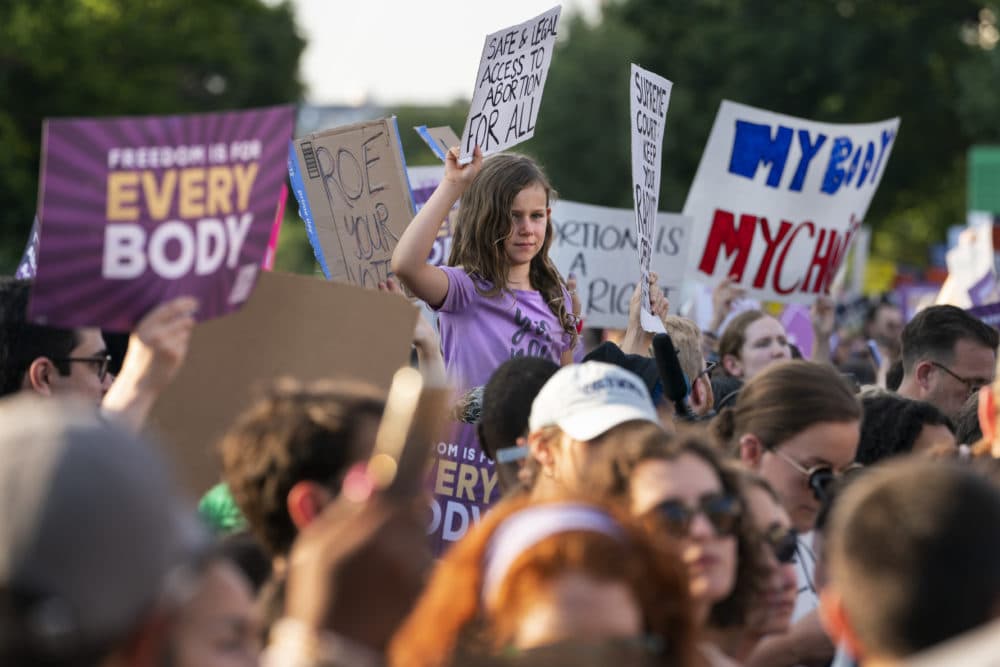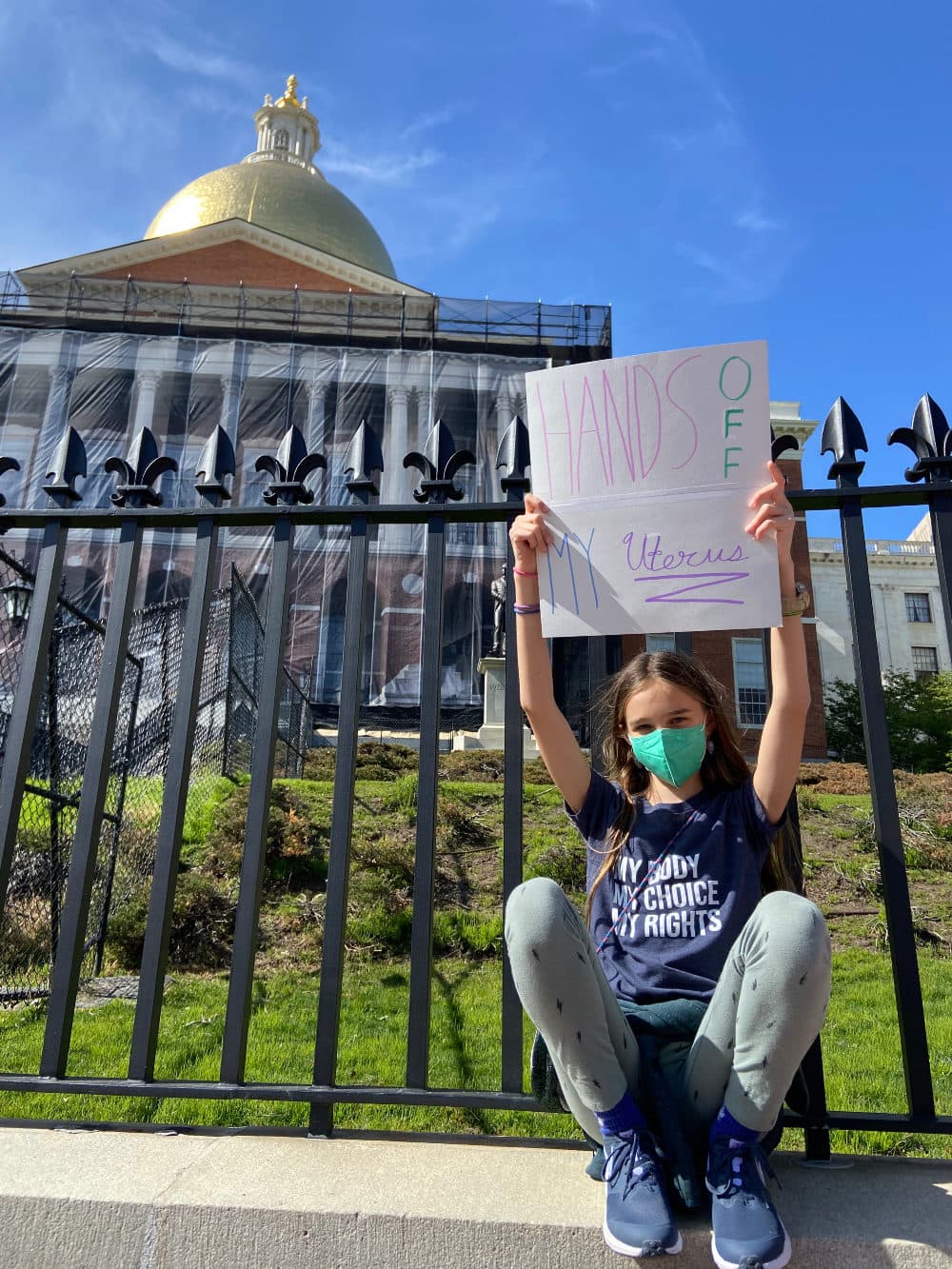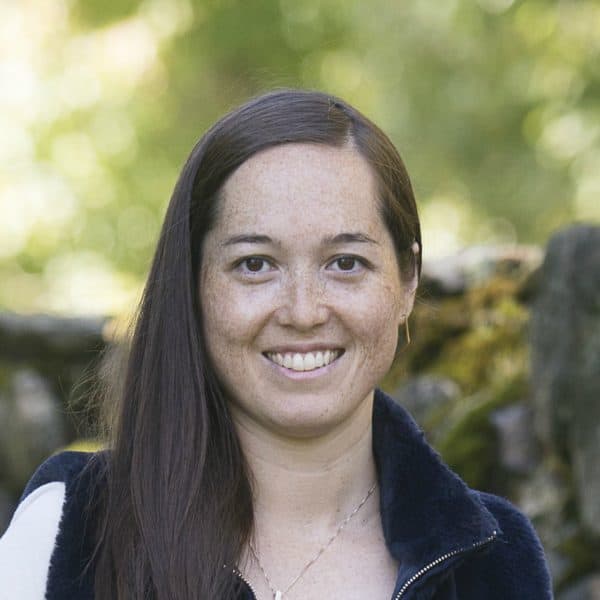Advertisement
Commentary
'My girls are part of that hope': Why I talk to my daughters about hard things

Life in a post-Dobbs United States is being compared to dystopian works of fiction, but for many it’s been a lived reality for some time. The field of gynecology was founded through brutal experimentation on enslaved women. Pregnant people — disproportionality Black and Indigenous, poor, or both — were already being criminalized for stillbirth and miscarriage. For those who didn’t feel impacted or implicated until Dobbs, your privilege is showing. Striking down Roe and Casey is part of a carefully-crafted, long-term plan to dismantle myriad civil rights, fueled by racism and classism and the patriarchy that buttresses them both. A plan that counts on the complicity of — and comfort we feel in — our silence.
My privilege shows in my assumption that my children would have it better than my mother’s generation and mine — that our safety nets of time and money would be enough, should they ever need an abortion. But this past week is certainly not the first time we have discussed bodily autonomy or our need to fight for a more equitable health care system.
“What’s sexual assault?” my 8-year-old daughter asked me when now Justice Brett Kavanaugh was nominated to the Supreme Court. The voice of Dr. Christine Blasey Ford was the soundtrack to our ride home, the radio tuned to NPR as she and her little sister piled into the car after school. My answer was messy, but I built off of conversations we had already had about sex and consent. My 6-year-olds’ eyes were wide. Her older sister stared straight at me in the rearview mirror.
“But did he do it Mama?”
I wanted to open the window and scream, but I breathed and again did my best.

I was 10 during Justice Clarence Thomas’ confirmation hearings. I remember seeing Anita Hill on TV and in the newspapers delivered to our apartment door. My journals from that time are filled with inane details about my social life. Then, on October 16, 1991, one line: “Yes! Judge Tomas [sic] got nominated for Supreme Court Judge.” My brain strains to remember how adults in my life spoke about the confirmation. I was deeply socialized into a late ‘80s/early ‘90s misogyny, one embedded into every TV show and ad I consumed, ever-present in the hallways of my elementary school where a proper civics curriculum was nonexistent.
And while I am disappointed in my 10-year-old self, I don’t have to repeat the cycles that led to my unchecked excitement that day. The oft-repeated line “believe Black women” rings in my head. Anita Hill told us. Rosa Parks did too — making plain why Thomas’ nomination would be a stepping stone to where we find ourselves today. I only learned of this thanks to a viral Tweet last week.
Advertisement
I want my daughters to connect the dots earlier. Our conversations are ordinary, often lasting no more than a few minutes. They are embedded into the fabric of our relationships, I hope, in a way that leaves room to build. I am honest when they ask questions I cannot answer. We research together; I reach out to friends who know more and circle back. We are all still learning.
Just as those who worked tirelessly to topple Roe have been doing so for decades, so too have those who run the clinics women rely on and the abortion funds that connect people with uteruses with crucial healthcare. This is what I think about when I am feeling unprepared for conversations with my children. If I waited until I reached some arbitrary bar of “readiness,” I might never start. I cannot wait — we cannot wait — because people, many more now than before Dobbs, are going to die when they are denied necessary care. Hard conversations, like advocacy, must be ongoing.
I was on a mother-daughter spring break trip, navigating long stretches of L.A. traffic with my then 11-year-old, during Ketanji Brown Jackson’s confirmation hearings. We listened as Senators Cruz, Hawley, Cotton, Graham and others hurled one racist and sexist question after another. We continued to discuss their vitriol, and its deep roots, long after we were out of the car.
Back from L.A., my daughter’s homework was to write a letter to someone she found inspirational. She chose Justice Jackson. She wrote a beautiful letter, filled with indignation at the injustices she had noticed during the confirmation hearings and deep admiration of and anticipation for Jackson’s past and future work.
As I read it, I felt an assurance that my daughter understands an important lesson I’ve been working to impart: that we must look through the prism of our individual and collective pasts to be able to see with clarity that which we are called to change.
The sixth graders mailed all of their letters. Maybe she will hear back.
Six days after Dobbs, as I watched Justice Jackson be sworn in, I felt the tears begin to well, as they had all month for various reasons. This time — when Jackson’s two daughters were named, when Justice Breyer came forward to administer the judicial oath — I cried with recognition of the next generation for whom we must not give up, and the people who continue to fight for what is just.
Organizer and educator Mariame Kaba is known for saying “hope is a discipline.” Inspired by a nun, it guides her abolitionist work to be, like all work grounded in justice, lifelong: the layering of (often unglamorous) labor onto the work of those who have come before, that will serve as a foundation for those who come after. In Kaba’s words, “It’s work to be hopeful. It’s not like a fuzzy feeling. You have to actually put in energy, time, and you have to be clear-eyed, and you have to hold fast to having a vision. It’s a hard thing to maintain. But it matters to have it, to believe that it’s possible, to change the world.”
My hope is grounded in my own incremental work. My girls are a part of that hope.
When the leaked draft of the Dobbs decision broke, we made signs and protested — not because protesting is sufficient, but because it is one way for my children to fit into the long history of channeling anger into action. Over meals we continue to connect the dots between how the justices who supported the decision got where they are; how we must spend our privilege; how we all have hope to cultivate, day by day.
I hope their journals contain, interspersed between the daily dramas of tween life, the seeds of their critical consciousness — ones planted far earlier than mine.
